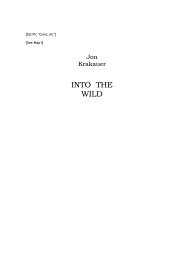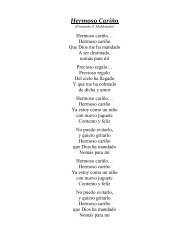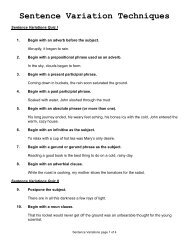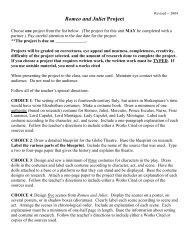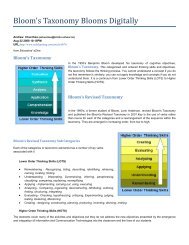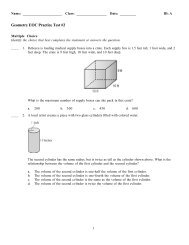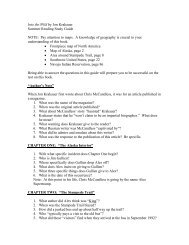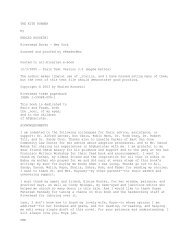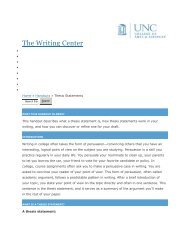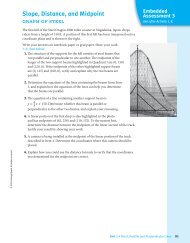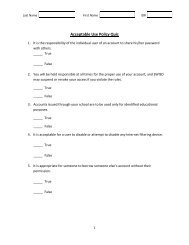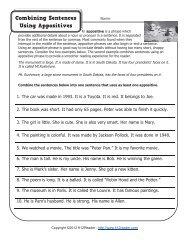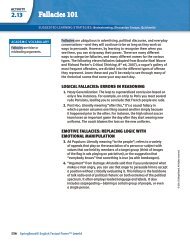Unit 1.pdf - Southwest High School
Unit 1.pdf - Southwest High School
Unit 1.pdf - Southwest High School
Create successful ePaper yourself
Turn your PDF publications into a flip-book with our unique Google optimized e-Paper software.
Activity 1.13<br />
continued<br />
Digging for Deeper Meaning<br />
My Notes<br />
Grammar<br />
&<br />
Usage<br />
Clauses are groups of<br />
words that contain a<br />
subject and verb. While<br />
dependent clauses cannot<br />
stand alone—do not make<br />
sense by themselves—<br />
independent clauses<br />
do. Notice this sentence<br />
from Kincaid’s essay:<br />
“My father, who might<br />
have sat next to me at<br />
breakfast, was a carpenter<br />
and cabinet maker.” The<br />
dependent clause “who<br />
might have sat next to<br />
me at breakfast” is an<br />
adjective clause that<br />
modifies the word “father.”<br />
Notice that the dependent<br />
clause is set off by<br />
commas because it is not<br />
essential to identify father.<br />
We know who father is<br />
without this information.<br />
A sentence with both an<br />
independent clause and<br />
a dependent clause is a<br />
complex sentence. The<br />
use of complex sentences<br />
enables writers to create<br />
sentence variety and<br />
establish relationships<br />
among ideas.<br />
Chunk<br />
2<br />
36 SpringBoard® English Textual Power Senior English<br />
pink and green, unlike any shadings of pink and green I had seen before,<br />
squiggly veins of red running in every direction. England was a special<br />
jewel all right, and only special people got to wear it. The people who<br />
got to wear England were English people. They wore it well and they<br />
wore it everywhere: in jungles, in deserts, on plains, on top of the highest<br />
mountains, on all the oceans, on all the seas, in places where they were<br />
not welcome, in places they should not have been. When my teacher had<br />
pinned this map up on the blackboard, she said, “This is England”—and<br />
she said it with authority, seriousness, and adoration, and we all sat up.<br />
It was as if she had said, “This is Jerusalem, the place you will go to when<br />
you die but only if you have been good.” We understood then—we were<br />
meant to understand then—that England was to be our source of myth<br />
and the source from which we got our sense of reality, our sense of what<br />
was meaningful, our sense of what was meaningless—and much about<br />
own lives and much about the very idea of us headed that last list.<br />
At the time I was a child sitting at my desk seeing England for the<br />
first time, I was already very familiar with the greatness of it. Each<br />
morning before I left for school, I ate breakfast of half a grapefruit, an<br />
egg, bread and butter and a slice of cheese, and a cup of cocoa; or half a<br />
grapefruit, a bowl of oat porridge, bread and butter and a slice of cheese,<br />
and a cup of cocoa. The can of cocoa was often left on the table in front of<br />
me. It had written on it the name of the company, the year the company<br />
was established, and the words “Made in England.” Those words, “Made<br />
in England,” were written on the box the oats came in too. They would<br />
also have been written on the box the shoes I was wearing came in: a bolt<br />
of gray linen cloth lying on the shelf of a store from which my mother had<br />
bought three yards to make the uniform that I was wearing had written<br />
along its edge those three words. The shoes I wore were made in England;<br />
so were my socks and cotton undergarments and the satin ribbons I wore<br />
tied at the end of two plaits of my hair. My father, who might have sat<br />
next to me at breakfast, was a carpenter and cabinet maker. The shoes<br />
he wore to work would have been made in England, as were his khaki<br />
shirt and brown felt hat. Felt was not the proper material from which a<br />
hat that was expected to provide shade from the hot sun should be made,<br />
but my father must have seen and admired a picture of an Englishman<br />
wearing such a hat in England, and this picture that he saw must have<br />
been so compelling that it caused him to wear the wrong hat for a hot<br />
climate most of his long life. And this hat—a brown felt hat—became so<br />
central to his character that it was the first thing he put on in the morning<br />
as he stepped out of bed and the last thing he took off before he stepped<br />
back into bed at night. As we sat at breakfast a car might go by. The car,<br />
a Hillman or a Zepher, was made in England. The very idea of the meal<br />
itself, breakfast, and its substantial quality and quantity was an idea from<br />
England; we somehow knew that in England they began the day with<br />
this meal called breakfast and a proper breakfast was a big breakfast. No<br />
one I knew liked eating so much food so early in the day: it made us feel<br />
© 2011 College Board. All rights reserved.



